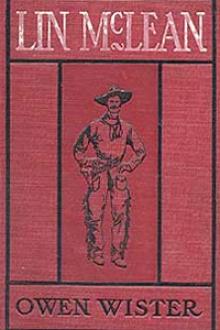The Virginian: A Horseman of the Plains, Owen Wister [best e books to read txt] 📗

- Author: Owen Wister
Book online «The Virginian: A Horseman of the Plains, Owen Wister [best e books to read txt] 📗». Author Owen Wister
His voice had trembled, and I felt the deep emotion that seemed to gain upon him now that action was over and he had nothing to do but think. And his view was simple enough: you must die brave. Failure is a sort of treason to the brotherhood, and forfeits pity. It was Steve's perfect bearing that had caught his heart so that he forgot even his scorn of the other man.
But this was by no means all that was to come. He harked back to that notion of a prisoner helping to make it easy for his executioner. “Easy plumb to the end,” he pursued, his mind reviewing the acts of the morning. “Why, he tried to give me your newspaper. I didn't—”
“Oh, no,” I said hastily. “I had finished with it.”
“Well, he took dying as naturally as he took living. Like a man should. Like I hope to.” Again he looked at the pictures in his mind. “No play-acting nor last words. He just told good-by to the boys as we led his horse under the limb—you needn't to look so dainty,” he broke off. “You ain't going to get any more shocking particulars.”
“I know I'm white-livered,” I said with a species of laugh. “I never crowd and stare when somebody is hurt in the street. I get away.”
He thought this over. “You don't mean all of that. You'd not have spoke just that way about crowding and staring if you thought well of them that stare. Staring ain't courage; it's trashy curiosity. Now you did not have this thing—”
He had stretched out his hand to point, but it fell, and his utterance stopped, and he jerked his horse to a stand. My nerves sprang like a wire at his suddenness, and I looked where he was looking. There were the cottonwoods, close in front of us. As we had travelled and talked we had forgotten them. Now they were looming within a hundred yards; and our trail lay straight through them.
“Let's go around them,” said the Virginian.
When we had come back from our circuit into the trail he continued: “You did not have that thing to do. But a man goes through with his responsibilities—and I reckon you could.”
“I hope so,” I answered. “How about Ed?”
“He was not a man, though we thought he was till this. Steve and I started punching cattle together at the Bordeaux outfit, north of Cheyenne. We did everything together in those days—work and play. Six years ago. Steve had many good points onced.”
We must have gone two miles before he spoke again. “You prob'ly didn't notice Steve? I mean the way he acted to me?” It was a question, but he did not wait for my answer. “Steve never said a word to me all through. He shunned it. And you saw how neighborly he talked to the other boys.”
“Where have they all gone?” I asked.
He smiled at me. “It cert'nly is lonesome now, for a fact.”
“I didn't know you felt it,” said I.
“Feel it!—they've went to the railroad. Three of them are witnesses in a case at Evanston, and the Judge wants our outfit at Medicine Bow. Steve shunned me. Did he think I was going back on him?”
“What if he did? You were not. And so nobody's going to Wind River but you?”
“No. Did you notice Steve would not give us any information about Shorty? That was right. I would have acted that way, too.” Thus, each time, he brought me back to the subject.
The sun was now shining warm during two or three minutes together, and gulfs of blue opened in the great white clouds. These moved and met among each other, and parted, like hands spread out, slowly weaving a spell of sleep over the day after the wakeful night storm. The huge contours of the earth lay basking and drying, and not one living creature, bird or beast, was in sight. Quiet was returning to my revived spirits, but there was none for the Virginian. And as he reasoned matters out aloud, his mood grew more overcast.
“You have a friend, and his ways are your ways. You travel together, you spree together confidentially, and you suit each other down to the ground. Then one day you find him putting his iron on another man's calf. You tell him fair and square those ways have never been your ways and ain't going to be your ways. Well, that does not change him any, for it seems he's disturbed over getting rich quick and being a big man in the Territory. And the years go on, until you are foreman of Judge Henry's ranch and he—is dangling back in the cottonwoods. What can he claim? Who made the choice? He cannot say, 'Here is my old friend that I would have stood by.' Can he say that?”
“But he didn't say it,” I protested.
“No. He shunned me.”
“Listen,” I said. “Suppose while you were on guard he had whispered, 'Get me off'—would you have done it?”
“No, sir!” said the Virginian, hotly.
“Then what do you want?” I asked. “What did you want?”
He could not answer me—but I had not answered him, I saw; so I pushed it farther. “Did you want indorsement from the man you were hanging? That's asking a little too much.”
But he had now another confusion. “Steve stood by Shorty,” he said musingly. “It was Shorty's mistake cost him his life, but all the same he didn't want us to catch—”
“You are mixing things,” I interrupted. “I never heard you mix things before. And it was not Shorty's mistake.”
He showed momentary interest. “Whose then?”
“The mistake of whoever took a fool into their enterprise.”
“That's correct. Well, Trampas took Shorty in, and Steve would not tell on him either.”
I still tried it, saying, “They were all in the same boat.” But logic was useless; he had lost his bearings in a fog of sentiment. He knew, knew passionately, that he had done right; but the silence of his old friend to him through those last hours left a sting that no reasoning could assuage. “He told good-by to the rest of the boys; but not to me.” And nothing that I could point out in common sense turned him from the thread of his own argument. He worked round the circle





Comments (0)